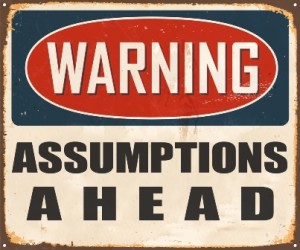What do Sony, Radio Shack and Sears all have in common (besides instant brand recognition)?
 They’re all losing money, and lots of it.
They’re all losing money, and lots of it.
According to a recent Forbes article entitled “Wrong Assumptions Create Lousy Results,” Sony has lost money for 15 out of the last 16 quarters, and projects a loss of $2 billion this year. Radio Shack teeters on the verge of bankruptcy. Sears hasn’t shown a profit in three years, and its debt has been downgraded to the lowest junk level.
Even the seemingly unshakable fast food titan McDonald’s has hit a serious growth stall, with same-store sales declining and a new generation of casual diners taking their appetites and their dollars elsewhere.
The problem, says the article’s author, Adam Hartung, isn’t a lack of resources, focus or talented management. In fact, as the title implies, the downhill spiral of these once untouchable market leaders stems from a failure to update their most basic (and cherished) assumptions about their business models. Interestingly, Hartung attributes the lack of assumption updating to an over-emphasis on operational excellence. He believes that a laser-like focus on finance, cost management, supply chain management, automation and other operational components creates a bias for historical data analysis rather than forward-looking thinking. So when markets shift, as they do very rapidly these days, operationally-focused companies tend to get stuck in the past rather than looking at what needs to change.
Hartung makes a good point, but in many cases I think the problem goes beyond that. In my experience, most organizations – regardless of their strategic approach – simply don’t recognize their assumptions and how they contribute to screening out data that could be critical to survival.
I’ve been preaching this to my clients and keynote audiences for years: one of the most critical leadership skills in the 21st century is the ability to recognize and challenge our prevailing assumptions about our customers, our markets and the world in general. And as the world continues to move ever faster, this skill will become increasingly important.
Let me suggest a few techniques for honing this skill, pulled from my latest book, Using Your Brain to Win.
Expand your data-gathering horizons.
When we read, see and hear the same sources of information day after day, it tends to reinforce what we already think and believe. Deliberately exposing ourselves to contradictory points of view helps to bring our unspoken assumptions to the surface. To broaden your sources of data:
- Subscribe to at least one magazine or newsletter that has to do with your customers’ business or industry.
- Follow a blog that has nothing to do with your business.
- Pay attention to demographics and trends from at least three different areas not related to your business.
Learn to recognize corporate denial.
Corporate denial can be a real killer. It looks and sounds like many different things, including:
- Thinking that most of what you know about your business is still true.
- Believing that what made you successful so far will continue to make you successful in the near future.
- Not looking beyond the narrow boundaries of your industry to keep abreast of new trends and developments.
- Expecting that your next big competitive threat will come from within your industry.
- Automatically discounting new technologies, such as social media, because you don’t think they apply to your business.
To cure corporate denial, stop blaming the company’s problems on external factors such as the economy or a “down” market. Question your attitudes, beliefs, and assumptions on a regular basis, and learn to anticipate change rather than react to it.
Don’t make decisions without hard data.
Establish processes for collecting, verifying and validating your data, and make them an integral part of your decision-making process. An ounce of accurate information outweighs a ton of assumptions that may or may not be true.
Most of all, never take your success (or your customers) for granted. Constantly ask, “How has our customer’s world changed in the past six to 12 months? Are the ideas, assumptions, processes, and systems that made us successful still valid in today’s world? If not, what do we need to change and how do we need to change it?”
Sony, Sears and Radio Shack aren’t the only ones paying a price for failing to update their assumptions. If you don’t update yours on a regular basis, a similar fate awaits.
Call to action: Identify at least one unspoken assumption that drives your business, then check to see whether it is still true.








